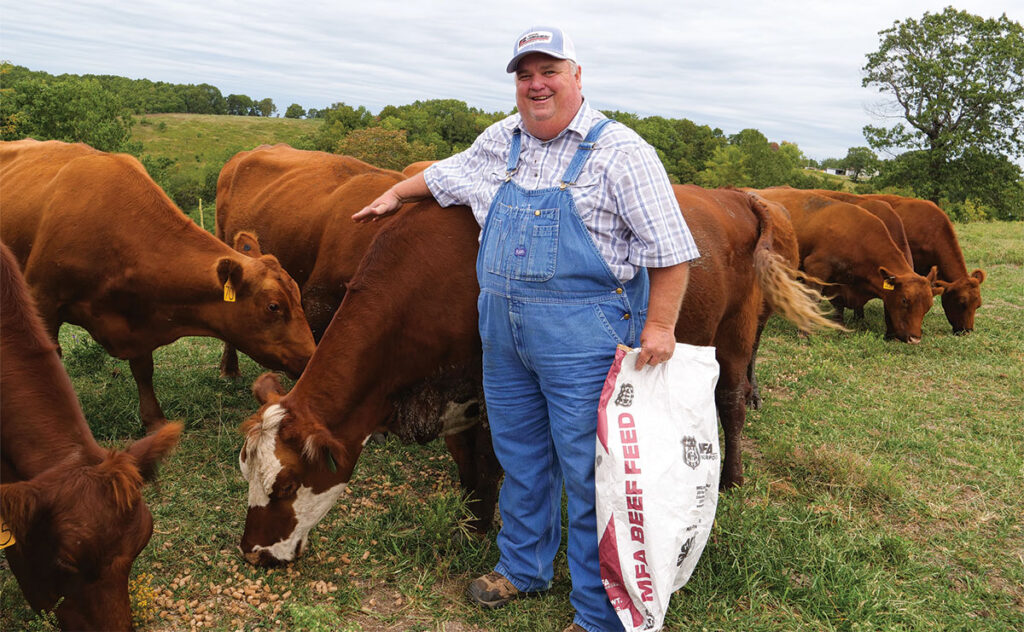
The Berry family offers beef, commercial and registered cattle at Empty Wine Glass Red Angus Farm
RUETER, MO. – Rusty Berry is a fourth-generation farmer who runs the Empty Wine Glass Red Angus Farm that raises both commercial and registered Red Angus cattle.
Rusty has continued his family’s long linage of cattle herdsman, stemming back to 1893 in the Oklahoma Run. His great-grandfather, Andrew Berry, ran Hereford and black baldies along with Rusty’s father, Vernon, and two uncles.
Today, Rusty operates three farms with his wife, Lisa Berry, that consists of 487 acres in the Rueter, Mo., area. The Berrys have 25 registered Red Angus and 40 commercial Red Angus, while their son, Garrett Berry, raises bucking stock on the property. The Empty Wine Glass has continued to be a family business. Although Garrett, his wife Janelle, and Lisa have full-time jobs elsewhere, everyone is able to contribute to the family business. Rusty and Garrett run the many duties of cattle operations, Garrett’s wife Janelle handles the paperwork, and Lisa helps with administrative operations.
The Berrys sell their commercial cattle for beef to locals in the area and will sometimes sell them at the Salem, Ark., auction. Customers also seek their commercial heifers as replacement females. As for their registered stock, fellow producers buy their animals for breeding stock and once a year the Berrys sell at the Missouri Red Angus Association sale in Springfield, Mo.
The Berrys love working with Red Angus. Rusty enjoys how docile and easy to handle this breed is, as, “nothing runs you up a tree, even the bulls are good.”
He said Red Angus are popular today, as they have been the top-selling heifers in the United States over the past 10 years. He feels that has to do with the breed’s heat tolerance and how the Red Angus are able to eat longer in the day, both before and after the hottest parts of the afternoon, than Black Angus. This gives them an advantage in gaining weight and staying healthy.
Although mainly grass-raised, the Berry’s do use supplemental grains for feeding. Since Garrett works at the MFA Fertilizer Plant, the Berry’s use MFA Cattle Charge for feed. This feed not only has protein minerals to help with maintaining good health but it also helps in weaning cattle, as it includes medication that aids in keeping the calves healthy during weening when the cattle are most susceptible to sickness.
In the winter time, cattle are given hay and cattle cubes for extra protein. In the summer, they graze on grass but are supplemented with cubes, based on how much rain the Berry farms have received. Rusty said this year they did more supplemental feeding because of the dry weather. Rusty believes supplemental feeding provides many benefits to the cattle and their health. He says the feeding regiment, “keeps them coming to you,” and helps with observation for disease, spraying for flies, and in any doctoring that may need to be done.

When it comes to breeding, the Berry’s go the natural way. Calves are fence-line weened starting at 7 months of age, with two or more sectioned off together at a time. For the first three weeks, calves are kept in a corral so they can still feel their dam’s touch and be near to her. Rusty believes this helps with sickness and in bringing more for them at auction. He uses a 60-day weaning period and has found this brings him 20 to 30 cents more per pound than cattle weaned for 45 days, as they rarely go back to their mommas after 60 days.
Retained heifers are kept sperate from the main herd until 14 months of age, and then introduced to the breeding herd.
Off the farm, Rusty is currently the president of the Taney County Cattlemen Association, and believes in the association and how it can help the community.
The association is also working with Mo Beef Kids to help youth in the area have access to affordable and healthy beef. Their most recent project was with the Mark Twain, Taneyville, and Kirbyville schools to, “get a lot of beef in front of a lot of kids.” Recently, the association was able to get 250 pounds of meat to each school at a cost of $1.59 per pound of processed beef. The association donated the cattle and the schools paid for the processing. One school was even able to get the $400 processing fee, at a USDA processing plant, paid for by donors. Rusty believes this program will revolutionize the diets of kids who commonly eat chicken and are missing out on the many benefits of the local cattle industry.
Rusty is also a retired law enforcement officer of 32 1/2 years. For 28 years, he was the deputy sheriff in Topeka, Kan., and the chief of police for a school district of more than 8,500 kids for four and a half years. He said during his time working with the youth, he always noticed they were eating chicken, as chicken was cheaper for the schools to purchase. As a cattle farmer, he believed this shouldn’t be the case, that something could be done to help kids eat beef affordably too. Now, kids in his area are, “eating beef 11 out of the next 16 meals,” at the schools who were involved in the Mo Beef Kids program. Rusty is also thankful for the time he and his wife get to spend at the Taney County Cattleman Association and all the support they are providing for the youth in their community.
The Berrys are currently downsizing some of their property and enjoying time with their grandchild and soon to be grandchildren. Rusty grew up in the Forsyth, Mo., area and plans on staying in Taney County with his family for the future. There is, however, no end in sight for the Empty Wine Glass Red Angus Farm.







